A US Army combat veteran offers sharp insight into the Islamic Caliphate, Arab Sunni influence and how to defeat ISIS. A Lima Charlie News OpEd.
I have been commanded to fight against people so long as they do not declare that there is no God but Allah
-Sahih Muslim 1:31
|By Maj. Joe Labarbera, Lima Charlie News OpEd
To attempt to understand ISIL by analyzing its tactics, order of battle, or its command structure is a fool’s errand akin to the parable of seven blind men trying to understand the elephant. Understanding this monstrous entity and defeating it, is a matter of gaining an intimate understanding of the Arab Sunni world.
This will appear as absolute chaos to Westerners whose root beliefs and even light-hearted paradigms prevent them from even recognizing, let alone understanding, the Arab Sunni mindset. Therefore, when presented with the realities of the Arab Sunni world, Westerners retreat inward to either excessive liberality or excessive militancy, seeking either to surrender to, or destroy, what they don’t have the intellectual or cultural means to understand. As a result, the Islamic Caliphate (ISIL) is too intense an entity for many in the modern West to comprehend because they either become fixated on the Caliphate’s atrocities, or become filled with trepidation they will mistakenly judge all individual Muslims to this standard. The Caliphate’s machinations, however, are often compatible with the minds of modern Arab Sunnis.
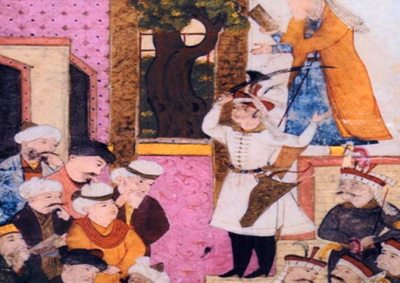 In truth, by any standard of history, the modern Arab Sunni world is the very definition of chaos. Yet, it wasn’t always so. What the West fails to realize is that the Arab Sunnis of today are in a crisis of historical proportions, and that the Islamic Caliphate is simply one of many destructive reactions of the Sunni’s collapsing civilization—a civilization that is drowning in the modern world.
In truth, by any standard of history, the modern Arab Sunni world is the very definition of chaos. Yet, it wasn’t always so. What the West fails to realize is that the Arab Sunnis of today are in a crisis of historical proportions, and that the Islamic Caliphate is simply one of many destructive reactions of the Sunni’s collapsing civilization—a civilization that is drowning in the modern world.
The following is an explanation of the modern Middle East dynamic from large to small. It presents for the reader a model for understanding how the anxiety of the Sunni Arab world is, in actuality, the root cause and support base for the Caliphate. It is my hope that this work will clarify the Islamic Caliphate’s strengths and weaknesses and, perhaps, foretell things to come.
As the Arab Sunni world faces economic and political marginalization, it is in a quandary, because its very cultural foundation and geographic locality are incompatible with the modern world and it doesn’t possess the ability to adapt. Other than control and ownership of major oil reserves, this group presents marginal tangible value to leverage internationally. It has almost no capacity to make efficient use of resources, manufacturing, or offer the world assistance with various problem sets. Other than its remaining elites accepting large stipends in the form of petro-dollars for its oil, these are people who have absolutely nothing, but yet believe they should have everything, based on their faith. Therefore, the Sunni Arab world will replay its historical attempts at adaptation to the West’s initiatives. Only this time, it may not work, because of the severely fractious political, economic and religious shifts that have been occurring faster than established orders can adapt to. The Sunni world may indeed be experiencing their civilization being inadvertently, but forcibly, reshaped by the modern world.
It’s an obvious observation that the Caliphate is an example of Sunni Arab resurgence. However, resurgence isn’t necessarily progress—in this case, it’s a regression. What the West is in fact dealing with when suffering from this resurgence, quantified by a World Wide asymmetric warfare called “terrorism,” is, in fact, the death throes of the Arab Sunni world and the recentering of Islam to the Shiites; hence, the rise of Iran. This could actually be a positive development for the West, the explanation of which I plan to delve into in this work.
Oh, East is East and West is West, and never the twain shall meet,
Till Earth and Sky stand presently at God’s great Judgment Seat;
But there is neither East nor West, Border, nor Breed, nor Birth,
When two strong men stand face to face, though they come from the ends of the earth!
-Kipling
The Western weakness of narcissism
In Marine Corps Officer’s training, we learned that before we analyze the enemy situation, we must first rotate the map and see the ground from the enemy’s perspective. Only then can we know which approach to take.
The West must do this with relation to the Arab Sunni world and simultaneously shed their paradigms and hear their fears and ambitions. The Arab Sunni contemporary worldview, emitting from Mecca, stifles its very population base for a number of reasons. It is paradoxical in that it can’t contend with its own orthodoxy and simultaneous peaceful coexistence with non Muslims or, for that matter, secular Muslims. It is utterly xenophobic, forbidding non Muslims from even entering Mecca, or allowing any interaction between its own intelligentsia and that of the Western World. Obstinately protectionist, it limits its people’s intellectual capacities by enforcing a view of the greater good as being achieved from the smallest social units upward, rather than the larger good transmitting downward to benefit the individual, as does the nation-state concept of the West.
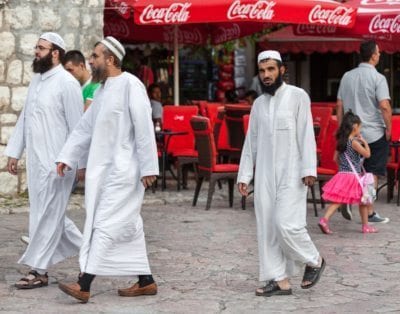 Jealousy and lethargy abound among many religious scholars of Mecca, further disrupted by manipulative intrigue on the part of the Saudi royal family. This prevents any effective doctrine or guidance that Mecca may offer the Sunni world. There is no Islamic version of Vatican dogma in Sunni Islam, or Martin-Luther-like treatises that can guide the social order. The process for individual Sunni Muslims to become religious authority figures is very loose, opening the door for a torrent of heresies.
Jealousy and lethargy abound among many religious scholars of Mecca, further disrupted by manipulative intrigue on the part of the Saudi royal family. This prevents any effective doctrine or guidance that Mecca may offer the Sunni world. There is no Islamic version of Vatican dogma in Sunni Islam, or Martin-Luther-like treatises that can guide the social order. The process for individual Sunni Muslims to become religious authority figures is very loose, opening the door for a torrent of heresies.
Compounding this imbalance is that the Sunni world lacks intellectual, religious, or political leadership which can effectively define Islam for Sunnis, and advocate on their behalf. This state of affairs is largely due to the fact that the West’s almost superhuman scale of achievement in the 19th and 20th centuries has absolutely outpaced their own.
The second order effect of this is the resulting suffocation of the Sunni’s ability to maintain their old order. The inability of the Sunni world to adapt to the meteoric rise of the West has debilitated them as a civilization.
We, in the West, must see the Arab Sunnis through the lens of history. Here, they have always been led by the power of royal dynasties, all of which maintained the unique bureaucracy of an Islamic Caliphate which could control the excessive zealotry so essential to the momentum of early Islam. These dynasties established a social contract among the Sunnis which quasi-harmonized the Islamic world, and maintained political stability legitimatized by the religious establishment of Mecca.
Outside of the complications of Islam, throughout history, the Arab Sunni world balanced itself by profiting from their position at the crux of trade routes between Europe and Asia. Until the battle of Lepanto in 1571, where a coalition of Catholic navies essentially broke the united military power of Islam, Sunni dynasties further enhanced their civilization’s wealth by war. They acted as if they had an effective “national strategy” of attacking Europe in some shape or form across every other generation, and colonizing various peoples in regions like the Balkans, the Caucuses, parts of sub-Saharan Africa—all places that today adopt the façade of Sunni Islam, but are as politically, economically and culturally removed from Mecca as a small Baptist church in Alabama is.
In previous centuries, the Mecca based Sunni world was rich enough to hire these people for their manpower, and military might, following the Arab supremacist paradigm of being too good to fight themselves—very much the way the Saudis, Kuwaitis, Emirates approach warfare today. Only today, they no longer have the wealth to recruit military might, which is why their alliance with America is so critical and tenuous. Seeking to maintain Western support, which they negotiate into Western obedience, the Arab Sunni world plays the complicated game they have played historically: They shrewdly used religious-military outbursts to exert concessions from European powers in the international trade system of the time.
The Arab world, devoid of resources, living along road/canal connected communities throughout intemperate deserts, prospered by basically extorting from wealthier civilizations. These extortions manifested in various forms throughout history. An example of this variance is seen after the Sunni loss at Lepanto; no longer able to extort European powers, they adapted from this loss by becoming probably the most highly effective enslavers in the world, and shrewdly established trading posts around Indonesia and Africa where they reaped tremendous commissions for slaves and provided weigh stations for European traders to refit. The West abandoned slavery though, to the economic detriment of the Arab Sunnis. Lacking this industry, Sunni Islam, which had been Arab dominated, fell to the rule of the Turks, who over the years became more and more separate from Mecca.
The Turk’s rule over the Sunni world was draconian, monstrous by any standard of regimes in history. The Turks were far more interested in conquering Europe than reforming or improving their own empire. This is because, to a Sunni Muslim’s logic, they are already perfect, and the world ought to reform to be like them. Therefore, the Turks were free to go about fruitless pursuits, such as challenging the Russian Empire, fighting among themselves, all in all having little interest in allowing religious and economic progeny. Hence, Sunni Islam stifled, remained the purview of the Arabs, devolved into an introverted cult, and hasn’t become aware of the modern world to this day.
With the Turk’s defeat in the First World War, and further corrosion by corruption and atrocity, they capitulated into a weak nation-state leaving the Arab Sunnis in a state of dysfunction. The reaction was the rise of the Baath party, which the American-Israeli alliance recently destroyed, strangely with the misguided backing of the Saudis, and further throwing the Sunni Arab world into despair. Mecca, having become a tourist-trap-money-maker for the Saudi royal family, has been absent in filling the vacuum of religious leadership, leaving the Sunni Arab world to deal with the West using a pre-Lepanto concept of the world.
Overall, the Arab Sunni world lacks resources, industry, leadership, but has one thing, a militant Islam with legions of uneducated, frustrated men who have no visible future, in a sense, nothing to lose.
Weep not for me; think rather of the pestilence and the deaths of so many others.
-Marcus Aurelius, Meditations passage IX.2
We must quarantine some to protect the many
The Caliphate is like a disease occurring in an unhealthy body. The Sunni Arab world was in a sickness of despair at the turn of the 21st Century. The world watched as a tremendous vacuum of power, widespread poverty, and a culture of random violence was ushered in. This effectively traumatized millions of people, creating a leaderless, disoriented and desperate population, further aggravated and incensed by modern media technology, gaudily displaying the wealth and sexual decadence of the West – visions abhorrent to Sunni Arab Muslims. The latter individuals predicate their faith on conquest and conversion. They assume that the West’s soft power in the form of decadence is an attempt to conquer them.
The post-Cold-War West’s handling of its economic power, explained by the Neo-con work “Lexus and the Olive Tree” was taunting and inflammatory, and incited, rather than harmonized, the Sunni Arabs. In effect, this presented a direct challenge to their understanding of life itself. The West’s human rights sanctimony further aggravates the Sunni Arab, sending emasculating messages about their women’s state of existence, and pointing out their ineptness by offering to solve their problems, taking actions that highlight their failures, shaming them.
Most significantly, the Sunni Arab is completely abandoned by their spiritual authority in Mecca, and suffers under the plain site of the Saudi Royal family, which despite their wealth and possession of Islam’s spiritual epicenter, takes no leadership role in the Middle East. Instead, they callously watch it burn, and then use political intrigue to array the West’s forces against the rise of Iran.
The Iraq war became an American won victory for Iran, with Iraq’s Shia population embracing Iran’s hegemony. The disastrous “Arab Spring” further gutted whatever infrastructure held the already fractious Sunni Arab countries together. To be a Sunni Arab in what was Iraq, Syria, North Africa, Palestine was, in effect, to be an abandoned, stateless person. Conditioned by centuries of draconian tyranny, first by the Turks, then by the Baathists, the Sunni Arab populace became largely docile, completely focused inward on family, with no faith or willingness to sacrifice for anything other than themselves, and maybe their tribe. There aren’t any more Salahuddins to come save the day. History has taught the Sunni Arab to keep his mouth shut, feign subservience, and conspire to betray.
With no powerful entity to allow for this game to be played, the Sunni Arab is frustrated. In this bleak abyss, the Sunni Arab world has become the Devil’s playground, where men are acting like demon-parasites, only in this place there isn’t enough fertility to grow back what is being reaped.
To explain the Caliphate’s position in time and space, I imagine a social-cultural void in between one suffocating political tyranny (the Baathists) and another suffocating tribal tyranny (the Sunni Sheiks). With this as a foundation, one can forecast the future of a young, Sunni Arab man who falls askew of both, and falls into the void. This void has existed throughout time, being bordered before by the Baathists, the Turks, and, before that, the dynasties. The people who fell into the void between the political power and the tribal power engaged in rebellions and insurgencies, justifying themselves as super-Muslims of sorts, their answer to why the established order was no good. Through history, this created a state of discord and intrigue that became part of the norm, and part of the Sunni Arab’s character.
However this space was a small crack in the Sunni Arab dichotomy. The events of the 21st Century blasted this dichotomy into a socio-political grand canyon, and regional level displacement provided legions of young men to populate this canyon. If Mecca has had any influence in this, the influence has been a dark one, since its Salafist–puritanical message has inspired Al Qaeda, the September 11, 2001 attacks, and an international movement where the prodigal sons of Arabia attack the West instead of the Sunni Arab power structure. The Baathist answer to this problem was to just wipe them out.
For the Saudi Royal family, the answer wasn’t so simple—it was vastly more complicated, in fact. How could they maintain their stature as the royal family of Sunni Islam while killing off those who fell into the void of Salafist fanaticism, which in reality was the very religion they themselves followed? Their tacit action of not persecuting them within Saudi Arabia, so long as they didn’t act against the Saudi royal family, became an implied deal of redirection, allowing them a host—a support zone—within Arabia and other like minded Islamic kingdoms as long as they focused their violence elsewhere.
With the Baathist power structure in existence, there was a check to this expulsion of miscreants from Arabia. Assad, Qadafi, Saddam, Mubarak, all managed ruthless secret police networks that infiltrated and betrayed the renegade Salafists to imprisonment, torture and death. The American-inspired “Arab Spring” eliminated the only thing that was standing between the Salafists’ goal to build their utopia, hence the rise of the Caliphate. What the Caliphate ultimately provides is a home for the masses of forsaken souls whom the sick body of Sunni Islam expels, and like disease, jumps to other hosts as the ones they occupy die and no longer offer sustenance.
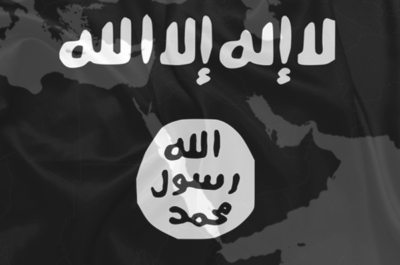 The Caliphate has been able to establish itself in a classic no man’s land in the heart of the Sunni triangle, on the periphery of where the local conventional power of Syria, Jordan and Iraq culminates. This no man’s land has water and fuel, and a host of docile, traumatized Sunnis which the Caliphate uses like cattle. The Caliphate is very familiar with this region, having been themselves the insurgent forces there that fought the Americans and Shia-dominated Iraqi Army for seven years, and now more effectively led by former Iraqi Sunni Army officers, who were purged by the rise of Shia power in Iraq. The Caliphate’s previous leadership—paradigm ridden, fanatical and inept—killed by the American military during the Iraq war, left room for the competent survivors to take over.
The Caliphate has been able to establish itself in a classic no man’s land in the heart of the Sunni triangle, on the periphery of where the local conventional power of Syria, Jordan and Iraq culminates. This no man’s land has water and fuel, and a host of docile, traumatized Sunnis which the Caliphate uses like cattle. The Caliphate is very familiar with this region, having been themselves the insurgent forces there that fought the Americans and Shia-dominated Iraqi Army for seven years, and now more effectively led by former Iraqi Sunni Army officers, who were purged by the rise of Shia power in Iraq. The Caliphate’s previous leadership—paradigm ridden, fanatical and inept—killed by the American military during the Iraq war, left room for the competent survivors to take over.
As part of Secretary Hillary Clinton’s sponsored/CIA engineered “Arab Spring” the American taxpayer gave the Caliphate a tremendous gift in the form of armored Humvees, machine guns, ammunition and small arms and anti-tank rockets, thinking that they were supporting some sort of “Free Syrian Army” that really never existed. It was a hoax put on by gangs of mercenaries who easily duped the American intelligence/diplomatic apparatus into believing they were some sort of Arab version of the WWII French Resistance, obviously and inadvertently appealing to the idealistic romanticism that clouds the American diplomatic corps’ judgment. These mercenaries quickly abandoned and sometimes sold these weapons and equipment to the Caliphate. Armed, secure in its location, led by former Iraqi Army officers, they built a cadre made up of former insurgents who fought both the Americans and the Assad regime. The Caliphate, a manifestation of the centuries old Salafist fantasy of an Islamic Utopia, began its war on–everyone.
Arm yourselves, and be ye men of valour, and be in readiness for the conflict; for it is better for us to perish in battle than to look upon the outrage of our nation and our altar.
1 Maccabees 3:58–60
Contemplating the cure
To only just defeat the Caliphate—hence, defeat ISIL—we need to take actions that eliminate their capability to achieve their intended goals. Ultimately, their goal is to conquer the entire world and forcibly convert all humans to Sunni Islam. Realistically, they aim to exist in a manner where their chief industry is establishing colonies of supporters around the world, and replace Saudi Arabia as the host for these supporters. Unlike the Saudi Arabia that simply provides passive support by turning a blind eye, the Caliphate will actively train, resource, and indoctrinate its Soldiers and fund their actions against the West.
The state of war provides to the Caliphate what peace provides a Western nation—prosperity. Without war, the Caliphate has no recourse to gain support from the rest of the Sunni world, no call to recruitment, and will stagnate to be targeted and undermined by its declared enemy, basically the entire non-Sunni Islamic world. Also, war gives the Caliphate the chance to extort money from other Sunni Arab nations. History will show that the Sunni Arab kingdoms likely paid huge sums to the Caliphate in exchange for the promise of not being attacked.
Therefore, there is no peaceful option with the Caliphate, let alone on ideological grounds, but even on practical grounds. The Caliphate must maintain a state of war to exist. The question of destroying the Caliphate, meaning rendering them incapable of reconstitution, would have to be a matter of eliminating the entire Sunni triangle as their support zone, and reconstituting the region with a refreshed population and infrastructure that is incompatible with supporting a resurgence. This would destroy the Caliphate as a practicing Islamic “state” but would likely expel it once again to the shadows of history, the untold stories of intrigues and assassinations that personify the history of the Sunni Arab world.
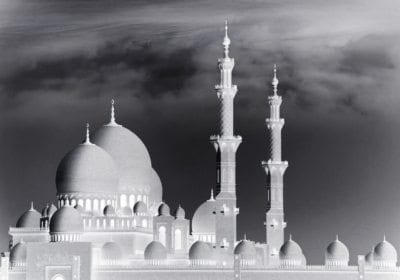 The state of the Sunni Arab world is sick, and pejoratively rotten to the core. It is incompatible with the international order, likely for the span of not just our lifetimes, but our children’s lifetimes. Therefore, no solution is available that suggests a Caliphate defeat can come from the Sunni Arab states. As long as the Sunni Arab world exists in its current state, and communities of Sunni proxies exist, either in the West or elsewhere, the Caliphate will have a huge recruiting ground. Using a call to arms appealing to the core zealotry of Sunni Islam, and reaping a crop of recruits of young Sunni males who have fallen through the cracks of history, the Caliphate will prosper.
The state of the Sunni Arab world is sick, and pejoratively rotten to the core. It is incompatible with the international order, likely for the span of not just our lifetimes, but our children’s lifetimes. Therefore, no solution is available that suggests a Caliphate defeat can come from the Sunni Arab states. As long as the Sunni Arab world exists in its current state, and communities of Sunni proxies exist, either in the West or elsewhere, the Caliphate will have a huge recruiting ground. Using a call to arms appealing to the core zealotry of Sunni Islam, and reaping a crop of recruits of young Sunni males who have fallen through the cracks of history, the Caliphate will prosper.
Destroying their water and oil supplies will undoubtedly degrade them. However, there is too much black market support and opportunities to loot from neighbors that they can use to sustain themselves. Their ability to extort other Sunni Muslims based on the threat of terroristic attacks will sustain them perpetually. In a sense, they have co-opted the majority of the Arab Sunni world as their support zone. Without the Baathist governments, and the dictators of the Middle East, there is no one to take out the garbage of the Arab kingdoms, therefore the security of Saudi Arabia, Yemen, UAE, Qatar, Jordan, and Kuwait depends on the existence of the Caliphate as a religious recycling plant/garbage dump. A lack of a Caliphate, without secular dictatorships in place to be the executioners, means that the fanatics of the Sunni world will come home to Arabia to roost. Defeating or destroying the Caliphate would require or, in a sense become, a coup de grace for the modern world’s execution of the radical Sunni Arabs.
A plethora of options exist that would mean either the defeat or destruction of the Caliphate as an entity. Yet, none are likely to occur because there is no benefit to any of the entities that could bring these options to realization. A thorough conquest of the Sunni triangle by a neighboring country, an all out war by the West, an all out war by a Russia-backed Syria, or a nuclear attack rendering the Sunni Triangle uninhabitable, are the only options that result in the Caliphate’s demise—its inability to reconstitute. Let us take each one of these options specifically, examining its feasibility, but addressing the second order effects later on.
Option one: A neighboring country performs a thorough conquest and occupation, ruthlessly dealing with the inevitable insurgency and establishing an infrastructure that makes the place actually livable. First, if this were to happen, the irreparably damaged collective psyche of the Sunni Arabs in the region will inhibit them from becoming prosperous citizens for at least several generations. Therefore, a migration of another population into the area would be needed, one that could prosper while the Sunni Arabs reestablish family life, schools, and rebuild their communities. The Caliphate, among the tremendous growth of other Salafist factions, infests the mosques and schools of the region. To end the Salafist infection, Sunni Islam would have to almost cease to exist there, or be supplanted by a secular version.
Neighboring nations that have the power to offer this option are Turkey, and Iran. Turkey is the most likely candidate. Historically it controlled this region, and it would allow it access to Mosul and Irbil oil fields. However, it would have to invest a substantial amount of blood and treasure to achieve this. With the current state of affairs, and the cost of a modern military, this doesn’t brief as a sound investment.
Iran, on the other hand, would terrify Israel by doing this, and further incite the United States, which sees them as a growing threat. They would, undoubtedly, use their Iraqi Shia proxies as cannon fodder, and this would further impede their cultivation of Iraq as a colony. Iran and the Shia Iraqis don’t really care about the Sunni Triangle. They have enough of their own problems and there are easier deals to be done elsewhere. Iraq will continue to make a good show about fighting the Caliphate in order to keep their people secure, and to defend against the Caliphate’s clear and present danger to Baghdad. Also, the Iraqis lack the foresight, the energy, and the resolution to follow through on an actual victory, and the current civilian government won’t have the stomach for the genocide that a conquest would entail. Perhaps in the future, a military-governed Iraq, supported by Iran, may do this, but not now.
Option two: All out war by the West. Not likely. America learned its lesson about intervention and is on course to forgo foreign wars and place its interests on the Western Hemisphere. However, the very existence of the Caliphate is anathema to Americans, and its attacks on American soil have wrought the ire of the American people. It is inevitable that America will increase attacks on the Caliphate, bombing infrastructure and assassinating its leaders. This offers a degradation of capability though, at best, without an actual ground conquest of the Sunni Triangle, the Caliphate will continue to operate. The idea that Western European nations would perform this option is not feasible because to a large degree, Western Europe is held hostage by volatile Islamic populations inside its borders, which could act as Caliphate proxies to an even greater extent than they are already. Western Europe is still in recovery from the carnage caused by the wars of the 20th century. Europe won’t recover its martial ardor until the last children of the Second World War have passed away.
Option three: The third option is the most likely of the three—a Russia-backed Syrian conquest of the region. This option is only limited by the degradation caused by the Syrian civil war, the Arab Spring and American efforts against the Assad regime. It will take some time for them to gain momentum, and the Syrians are the only people in the region who possess the stomach to do the amount of killing necessary to root out the Salafists.
Should Donald Trump become the next U.S. President, his stated intent to cooperate with Russia could lead to American-lent support of Syria, and the Russian effort as a whole. Vladimir Putin has often offered his cooperation in this endeavor. The current U.S. Administration’s approach to Russia has been, for the most part, antagonistic, with America trying to impose severely restricting “civilian” casualty averse rules of engagement, and restraining Russian targeting efforts. This has lead to Russia’s active efforts to shut out any American presence there. A Trump presidency could see the opposite. Both American and Russian support of a Syrian conquest of the Sunni Triangle could, in fact, cause the defeat, if not destruction, of the Caliphate.
Option Four: Not really an option, but worthy of mention, a nuclear attack on the Sunni Triangle would make it uninhabitable—effective, but not at all plausible. Over all, time is not on the side of the Caliphate. It is such a bad neighbor, and such an annoyance to the world, that little by little, the world will make its existence intolerable even to itself and eventually mass the resources and forces to end it. To achieve its end state, it must look to expand its support base beyond the Sunni Triangle.
The Caliphate thrives because of its power within the Sunni Triangle and the secret support of the Sunni Arab kingdoms. But this won’t be enough for it (in its own eyes) to win. This is why they look abroad for other support zones—Western Europe and America. The reason for this is twofold: one—the West has abundant wealth and two—Western nations are the only ones in the world that will incredulously tolerate their fanatical mosques, operatives, and activities. Even Saudi Arabia doesn’t put up with their nonsense. But the West, currently in one of its more liberal political cycles, not only does tolerate them, but officially pretends that the Caliphate is not doing what it is doing.
Currently, the Salafist community in the West is a tertiary source of funding, and a secondary source of recruitment. The Caliphate knows to only commit attacks in the West dramatic enough to improve its credibility as super Muslim fighters against a decadent West. These attacks raise donations, and the Caliphate doesn’t need to conduct an attack on the scale of 9-11, which would re-engage American vitriol in the form of overwhelming military violence. They wisely learned from the American retaliation and subsequent destruction of the bin Laden, Al Qaeda and the Mullah Omar Taliban regime. From a prosperous Sunni Muslim population in Europe and America, the Caliphate can supplement its income and gain more recruits to its cause, and quite possibly set up a second support zone from which to project more combat power.
The ultimate flaw in this stratagem is the Caliphate itself, its self-destructive pathology being its chief dysfunction. As it jumps from host to host, the way a virus jumps from a rotting corpse to a live one, the nations of the world will develop an immunity to them, by closing their hearts and minds, letting them die a self-imposed death in quarantine, their grave being the Sunni Triangle, their tomb being Arabia itself.
Three Rings for the Elven-kings under the sky,
Seven for the Dwarf-lords in their halls of stone,
Nine for Mortal Men doomed to die,
One for the Dark Lord on his dark throne,
In the Land of Mordor where the Shadows lie,
-J.R.R Tolkien, The Lord of the Rings
Arabian Dusk
The world’s Sunni Arabs are in the midst of a schism. In jeopardy due to a host of threats, but mostly from among themselves, the Arabian kingdoms have little hope for prosperity beyond their oil. A faith riddled with the Salafist heresy, they are locked in a death embrace with the West, needing it as both an enemy and a partner.
Looming on the horizon is a growing Iran, an Islamic nation that is immune to the Salafist virus. Iran looks to re establish the Shia–Persian Empire and is thoroughly bored with the intrigue and problems caused by the Arab Sunnis. Iran wants their oil, and wants the Sunnis gone. Perhaps more than that, they want Israel gone.
To the West, Assad leads a nation of Shiites in the Levant, rescued by the Russians and benefited by the inability of the current American government to accomplish their own mission in destroying him. As the Western world grows tired of horrific attacks on its population by radicalized Sunni Arabs, their Salafist proxies—the death embrace that the Arabian kingdoms hold—becomes less firm.
The Caliphate is the Sunni Arab doppelganger, what the Arab kingdoms secretly want to be—the old legendary warrior Muslims who rode out of the desert in the 9th century, led by Mohammed the prophet himself, slaying the enemies of Allah. They aren’t those people anymore though. Too accustomed to comfort and pleasure, too soft, they, nevertheless believe that if they can sponsor this effort, then maybe they can leverage the world with it, and still keep their treasures. Maybe they can still make the world fear Islam. Most of all, they can vaccinate themselves from their own inherited disease, a self-made toxin, one that only survives with the West as its host.
Joseph Labarbera, Lima Charlie News
Joseph Labarbera (USMC, U.S. Army) served as Command Inspector General at Ft. Irwin, California. Joe served 54 months combined OEF/OIF, with 46 months of combat in the Army’s 10th Mountain Division throughout Afghanistan and Iraq.
Lima Charlie provides global news, insight & analysis by military veterans and service members Worldwide.
For up-to-date news, please follow us on twitter at @LimaCharlieNe
#LimaCharlie #LimaCharlieNews
[This article was originally published June 30, 2016]

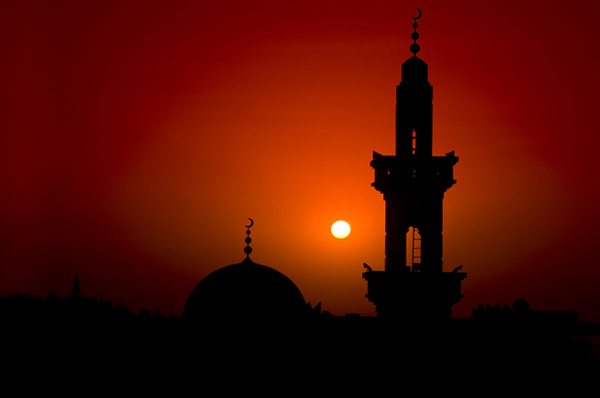





![Blossoming Russo-Turkish alliance leaves U.S., NATO behind [Lima Charlie News]](https://limacharlienews.com/wp-content/uploads/2019/07/Russia-Turkey-alliance-leaves-U.S.-NATO-behind-480x384.png)

